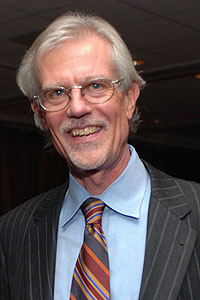Consortium director Easton earns nomination to lead federal IES
By William Harmsw-harms@uchicago.edu
News Office
 John Q. Easton |
|
President Obama will nominate John Q. Easton, Executive Director of the Consortium on Chicago School Research, to a six-year term as Director of the Institute of Education Sciences.
The Institute of Education Sciences is the nation’s engine for educational research, evaluation, assessment and statistics—instrumental to scholars, education policymakers and practitioners.
As Director of the IES, Easton would oversee four major national centers, a staff of about 200 as well as partnerships with institutions nationwide. The institute funds hundreds of research studies on ways to improve academic achievement, conducts large-scale evaluations of federal education programs and reports a wide array of statistics on the condition of education, such as the National Assessment of Educational Progress.
Throughout his career, Easton has focused his research on providing useful information to help the public and school leaders assess and advance school improvement.
Michael McPherson, president of the Spencer Foundation, the nation’s only charitable organization solely dedicated to educational research, said CCSR is widely known as the nation’s most successful example of a partnership between academic researchers and a major urban school system.
“John Easton has led a research team that responds to the needs of the educational community while maintaining high standards of academic integrity and independence,” McPherson said. “John knows research and researchers. He also knows schools—their issues, their opportunities and the people in them. I am confident that the nation will benefit as he brings his values and talents to the national level.”
The consortium is part of a larger initiative at the University to improve urban education through research, the creation of charter schools, teacher training and curriculum innovations. Founded in 1990, the consortium conducts research to inform and assess policy and practice in the Chicago Public Schools and expand communication among researchers, policymakers and practitioners as they search for solutions to the problems of school reform.
“John has provided remarkable leadership to the consortium and built an unrivaled organization to inform policy, practice and the public,” said Timothy Knowles, the Lewis-Sebring Director of the University’s Urban Education Initiative. “He has influenced in profound ways how we, and the nation, understand the needs of children growing up in urban America.”
Easton has been affiliated with CCSR since its inception and led its first research study. He became its Executive Director in 2002. Much of Easton’s research at CCSR examines trends in achievement test scores and the use of test scores in school improvement and school accountability efforts. He is co-author of a recent study on the relationship between freshman-year academic performance and high school graduation.
Under Easton’s leadership, the consortium has enjoyed a productive relationship with Arne Duncan, who spent seven years as chief executive officer of the Chicago Public Schools before his appointment this year as Secretary of Education.
“They are not ivory tower researchers,” Duncan said of the consortium in a 2003 Education Week article. “These are people who roll up their sleeves and get out to the schools and conduct research that is applicable to real situations.”
Easton first met the Secretary of Education in the early 1990s, when Duncan was involved in creating a South Side Chicago community school and sought Easton’s expertise on school data.
“The success Arne had in Chicago working closely with researchers might lead him to believe that the consortium is a valuable model,” Easton said. “Our model involves developing a deep knowledge about a school district, where you build coherence in your studies and in your findings. It could be very productive, especially in the larger urban districts across the country that continue to struggle with public education.”
Recently, the consortium has garnered considerable national attention for its studies following students from high school to college, and on the importance of the freshman year in high school graduation rates.
Easton also has had a long association with the Chicago Public Schools, having twice served as Director of the Department of Research, Analysis and Assessment, first from 1994 to 1997, and most recently from 2001 to 2002. Easton served from 2003 to 2007 on the National Assessment Governing Board, the independent board that sets policies for the National Assessment of Educational Progress, also known as the “Nation’s Report Card.”
The American Educational Research Association honored Easton with a Presidential Citation for “important contributions that helped to establish and advance a public-private research partnership.”
Easton co-authored the forthcoming book, Organizing Schools for Improvement: Lessons from Chicago. He holds a Ph.D. in Measurement, Evaluation and Statistical Analysis from the University and has been a Hyde Park resident since 1973.
![[Chronicle]](/images/sidebar_header_oct06.gif)